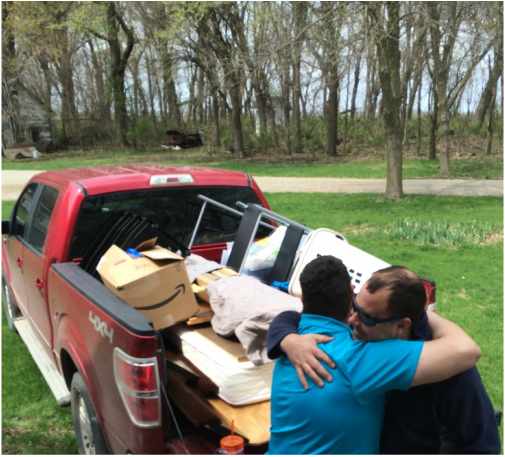|
It’s quiet in our house—it has been for a few days now.
It is simultaneously peaceful and heartbreaking. I’m enjoying truly listening to the birds and the breeze and the squirrels and the clunky regeneration of our water softener, but this quiet is also a reminder of what once was, but is no more. It’s quiet because our foster son moved out. The whole point of the foster care system is to reunite the kids with their parents, so on that front, we did succeed. We were told that up front—the purpose of foster care is reunification. We knew that. But after nine months of living with this kid, he began to feel like one of us, like he had always been part of our little family, making us laugh and cry and tear at our hair like all teenagers do. So this peace and quiet, this reminder of his absence, just feels like… A loss. He came over on Saturday to pack up his belongings, and he ate lunch with us, and he offered up the most beautiful prayer over our tuna salad sandwiches, thanking God for the time we’d had together and praying that we would continue to see each other. My eyes were a mess by the time he was done. After our lunch, when the pickup was loaded, he hugged us goodbye, and even though he was only moving five miles away, it felt like he was boarding a space shuttle to Jupiter. My heart was breaking. I did not want him to go. It was especially hard because I didn’t feel like he was ready to leave. There were so many other things I wanted to do with him, to help him with, to teach him. It seemed like he was making decisions that he wasn’t ready to make, and I didn’t understand why he was making them. There had been a lot of contention in our home about some of these decisions, and I just wanted to protect him from the consequences I was sure he’d face. I stayed behind, fighting the tears, while my husband pulled out of the driveway and took him to his new home. I could not bear the silence, the quiet, that followed. It was suffocating. So I filled it with the exact opposite of quiet: rock music. And, of course, because my life is a story filled with metaphors and signs and subtext, the first song that I heard on the station was Shinedown’s “Second Chance.” When I heard the chorus, I started to sob: Tell my mother, tell my father, I’ve done the best I can To make them realize this is my life I hope they understand I’m not angry, I’m just saying Sometimes goodbye is a second chance And that’s exactly it. We aren’t his mother and father, true, but there were times when it felt like we were. And his life is his own, and that’s something we need to understand. He is free to make his own decisions. The best I can do is offer my guidance and support, regardless of those decisions. My role as a foster mom is done with him. He won’t be coming home from school anymore to dump his shoes in a heap in front of the door, eat half a bag of Doritos, and watch Walker, Texas Ranger against my vehement protestations. He won’t be dancing in his socks in the kitchen or making us popcorn or insisting that Happy Chef is the best place to take a girl on a first date because it is “so expensive.” These will only be sweet memories of the time we had together. I plan to keep in touch with him, to watch him continue to grow and change, to be proud of his tremendous progress and growth, to be part of his life, just in a different way. It may not be the way I wanted, but it’s his life, not mine. I need to understand that. I hope this goodbye truly is a second chance for our relationship. I hope this goodbye gives us a chance to recognize him as an adult, as a peer even, and to help him and watch him achieve more than he ever thought possible. Sometimes goodbye is a second chance. There’s nothing worse than a boring story.
I hate books where nothing happens, where the protagonist encounters no struggles, no hardships, no enemies, no tests. There’s no sense of satisfaction upon completion of those books. I don’t feel better for having read them—they are never profound or meaningful. I’d go so far as to argue that they are not even stories, because nothing actually happens. As humans, we want to hear stories about overcoming. We want to hear stories about beating the odds and rising above challenges. We want to hear about champions, but we want normal champions—champions who look a lot like us. Champions in worse circumstances are even better. The storytelling juggernaut Pixar came up with 22 genius rules for telling a successful story. (They know a thing or two about that.) These rules hang in my office. I look at them and think about them a lot. And one day, when I was wallowing in my vat of self-pity, bemoaning the tragedy that had become my life, I looked at Rule #6, and my world was totally rocked: What is your character good at, comfortable with? Throw the polar opposite at them. Challenge them. How do they deal? It was then that I realized that I am a story. While I long to read stories about other people’s suffering, I have no interest in suffering myself. I would much rather experience that vicariously rather than first-hand. But if I am a story, then I must suffer, or else I am not a story at all. And that’s an earth-shattering realization for me, because it means that someone else is in charge of my life. Someone else is writing this thing for me. I am not in charge here. Someone else is throwing me the polar opposite of what I’m good at and comfortable with, challenging me, and seeing how I deal, all for the sake of a story. (In my personal attempts at writing, I have done the same thing to my own characters—writers must be a bit cruel to their characters or their work is meaningless.) Thus far in the story of my own life, I have tried very hard to live a boring, safe, non-story life where everything’s just awesome and easy all the time. But no one is made better for reading that tale. (Rule #2: You gotta keep in mind what’s interesting to you as an audience, not what’s fun to do as a writer. They can be very different.) That means that my life up until my diagnosis in 2012 was just the set-up, the mere exposition: I was established, comfortable, stable. I had discovered my talents and boundaries and had hidden my fears, packed up my insecurities and stashed them in a dark corner of my mind. Then I planned out the rest of my life so I would never be surprised and was always prepared, as long as I could stick to the plan. Disability was not even on my radar of possibility, much less part of my own plan. I should have made this connection between life and story years ago. I have a degree in English. I taught the elements of plot for seven years. And everyone knows that exposition is always the most boring part of any story. (Well, everyone except most ninth grade boys, who would argue that any story found in a textbook is boring in its entirety, but that is another rant for another time.) So, my first thirty years of existence, my comfort zone, had been mere exposition. My story was just getting started. This meant my epilepsy was the rising action in the plot of my life, that I had unwittingly boarded this crazy train and it was on its way up the side of the Matterhorn, ready to launch me into Switzerland or outer space or oblivion or an alternate universe or hell. I still have no idea where I’m headed or to what heights this rising action is, well, rising. I can only let go of my life plan (since I’ll need both hands to hang on to the lap bar with white knuckles), try not to scream, and hope for the best. As a control freak, this terrifies me. Rule #16 didn’t really help this feeling: What are the stakes? Give us reason to root for the character. What happens if they don’t succeed? Stack the odds against them. I did not want the odds stacked against me. And rule #1? You admire a character for trying more than for their success. Yeah. Wasn’t the whole point of life to be successful? I didn’t want to be admired for just trying. I wanted to be admired for my success. And I wanted that success to come easily. I would much prefer a life where I did not need a cheering section to applaud my clumsy, embarrassing attempts, and I did not want to think about what would happen if I did not “succeed.” (Especially when I’m not even sure what success looks like at this point in my life—it’s really different than it was when I graduated college, that’s for sure.) But rule #7 offered some solace: Come up with your ending before you figure out your middle. Seriously. Endings are hard, get yours working up front. Remember, stories have authors. They are planned. It was somewhat of a comfort to remember that my ending was planned (even if that plan was not of my own design), that my life, like a great Pixar story, might end beautifully, that all of these frustrating, embarrassing, humbling trials might weave and embroider the fabric of my own story, that it might become a beautiful tapestry. It was then that I realized that rule #7 was pretty much pulled straight from the Bible: “For I know the plans I have for you,” declares the Lord, “plans to prosper you and not to harm you, plans to give you hope and a future.” Jeremiah 29:11 is printed on just about every religious graduation card published in America, so it wasn’t exactly news to me, but after realizing that my life is a story and that God is the author, it brings comfort to know that my ending is already planned, that the ultimate goal is hope and a future. That sort of begs the question posed in rule #14: Why must you tell THIS story? What’s the belief burning within you that your story feeds off of? That’s the heart of it. That’s the heart of it. There’s something larger than me at work, telling the story of my life (and every life), to make a point, whether to reach others or inspire or simply to show others that they are not alone, that their suffering is not merely singular but part of a universal experience that molds us. Our stories are important. I am a story. And you are a story. We are all stories, and our individual stories intertwine into an even bigger story. Our unique stories are not boring. They are full of heartbreak and pain to contrast our joy and ease. They are full of challenges to build and refine our character. (That pun was not intentional, I swear.) Our stories exist to give others hope. Our stories are examples and influences and inspirations and “laughter for a hurting world,” to quote my dear dad. Our stories, as it happens, aren’t really about us. They’re about everyone. |
Old Stuff.
January 2023
Categories.
All
|


 RSS Feed
RSS Feed


